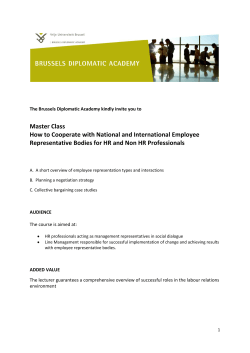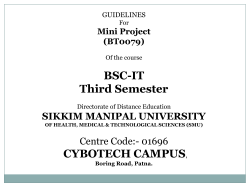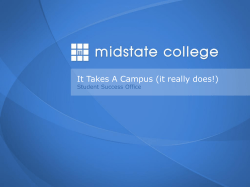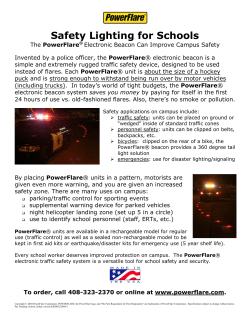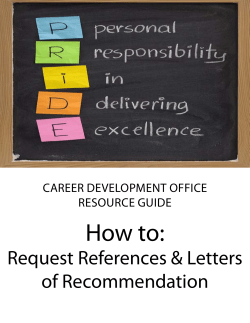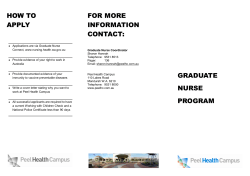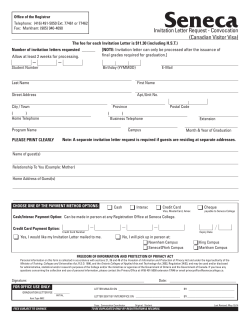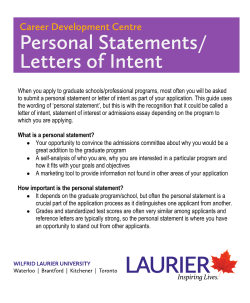
Professor Keene’s 18 Tips for Freshmen
Professor Keene’s 18 Tips for Freshmen How to Get The Most Out of Your College Experience 1) GET AN EDUCATION: You have come to college to get an education. It is worthwhile to take a few minutes to reflect on what it means to be an educated person. Oddly, few freshmen ever ask themselves what does it mean to be educated? You might begin by considering this question. For me, it means acquiring the background, skills and knowledge that will enable you to become an effective citizen, a member of a democratic society capable of putting your life to good use. Getting an education is not the same as preparing for a job or a career. Getting educated means being exposed to a wide range of complicated and new ideas and learning how to evaluate them. It means learning how to choose between competing arguments. It means learning about people who do not have the same background as you and figuring out how people with different ideas and different values can live together in peace. It means learning about the world and how it works. It means exploring how we ought to live and what we want to do with our lives. It means figuring out what you don’t know. Your education is not measured in test scores or GPA or in the sum of courses that you elect. And consequently your education neither begins nor ends at the classroom door. Therefore, you must think of your total experience at college as part of your education. You will find education in your life in the dorms, in your social interactions, in the clubs and co-curricular activities that you join, and of course in the classroom as well. To get the most out of your education you should consume broadly from all of the different programs that your campus has to offer. You should ask questions of your peers and your professors and not readily accept anything at face value. You may be fairly certain of what you want to study or what you want to do with your life. That’s OK. But please do not cut yourself off from the opportunity to explore new things. Take a wide range of classes, study things you didn’t know existed, join clubs or teams or political organizations, participate in community service learning, become part of a learning community ……get the most out of what your campus has to offer and find out what you are truly passionate about. And please be wary of anyone who says that you must begin planning for your career right now. Give yourself a chance to explore. 2) FIND THE BEST PROFESSORS AND TAKE THEIR COURSES. No one ever disagrees with this advice. If you find the best teachers in the University and take their courses, you will not be disappointed. You may not think that you are interested in the physics of music or Presidential biography or eastern religions or the natural history of viruses, but if the person teaching that course is a great teacher, you will become interested and you will learn a ton. Veteran students will tell you that it is much more important to choose professors than to choose courses. So find out who the great Profs are, and find a way to get into their courses. 2) DO NOT TAKE BAD COURSES. This seems pretty obvious. So it’s always sad when I advise a student who doesn’t like a single course that they are taking. How can this happen? Sometimes you don’t have a lot of choice in what courses you will take -especially during your first term. But afterwards, there is no excuse for taking a bad course. If you do your homework (talk to other students, upper-class folk, professors etc…) you should be able to fill your schedule with only good courses. And if there is only one Prof at your school who teachers a required course (like Organic Chem.) and they are notoriously awful, you can always find a way to get around that Prof (for example: take the course during summer school). Every school has a grapevine that passes on information on courses to take and courses to avoid. Make sure that you are plugged in. And make sure that you know the difference between good and easy. There is no point wasting your time in an easy course that has nothing new to teach you. Some of the best courses that you will take will also be the most demanding. 3) TRY SOMETHING NEW: Your college will offer you opportunities to study things that you did not know existed. When I arrived at the University of Wisconsin I had never heard of Anthropology but after a couple of courses I was hooked. Don’t stick to what you know. Seek out things that are new. Boldly go where you have never gone before. You will probably not have another time in your life where you are so free to be adventurous. 4) BALANCE YOUR COURSE LOAD. Different courses have different kinds of work requirements. KNOW in advance what is required in each. Some require substantial research papers. Some require a ton of reading. It’s not unusual for an English class to require a dozen books in a 14-week term. If you take 3 English classes, all with substantial syllabi, you will not be able to keep up with the reading. Similarly, it’s pretty tough to produce four substantial research papers in one term. So, try to come up with an array of courses that balance different kinds of requirements – writing, reading, weekly homework etc… 5) WRITE!!! The single best predictor of success after college is how well you write. It’s true. Your ability to communicate is even more important than your GPA and this has been, on occasion, painfully evident to me (as a director of graduate admissions) when people with good grades and impressive GRE’s write dreadful grad school applications. How do you become a better writer? By taking classes in which you are required to write. It’s pretty simple- the more you write, the better you get at it. This is especially important if you don’t particularly like to write. You need to develop this skill. So take courses that have lots of writing assignments where you will get substantial feedback about your writing. And if you are going into a field like engineering and you think this doesn’t apply to you think again. Professional engineers need to write lots of reports. And if you know that you don’t write well, most colleges have a writing center set up to help coach you with your writing. Don’t wait for someone to send you to the center. If you need help seek it out. 6) DO AN INTERNSHIP! The second best predictor of success is out of the classroom experience. Out of classroom experience through internships, experiential learning courses (like field schools) study abroad and community service learning all enhance your education, helping you link the theory of the classroom to practice in the real world. People who combine formal classroom learning with experiential learning generally get more out of their education (there is, in fact lots of research that supports this claim). And prospective employers and grad schools put a high value on people who have real world experience. 7) STUDY ABROAD. You will be graduating into a world that is far different from that faced by your teachers and parents when they graduated from college. The economy is now a global economy and we are becoming ever more closely linked with other peoples of the world into a global socio-political web. But it’s sad to say that in spite of rapid globalization Americans tend to have an extremely parochial view of the world and compared with people elsewhere have a very limited knowledge of what exists beyond our borders. If you want to succeed on this new global playing field you are going to have to have a better understanding of the world around you than the average American. And the best way to cultivate this understanding is to spend some time living in another country. Your college offers many opportunities to do this and you are also, in most cases, eligible to participate in programs offered by other colleges (and then transfer the credits back to your own). There are hundreds of programs that will give you the opportunity to study almost anywhere in the world (I heartily recommend somewhere in the third world- it’s all to common to go to Paris – use that French in Senegal or Martinique). Some programs are even affordable. Try to work in at least one semester or a summer of study abroad before you graduate. 8) LEARN A FOREIGN LANGUAGE (OR TWO) WELL. As I said above, it’s a global economy and even though English is the primary language of international finance and politics, we are the only major player on the global scene that educates our students to be monolingual. If you did not like language study in high school, don’t assume that it is a predictor of how things will go in college. Try again. I’ve seen more than a few students who had dismal experiences in HS who really embraced language study in college. Instruction at the college level is often (but unfortunately not always) light years better than in high school. And if you did study a language in HS it does not mean that you are done. Don’t avoid language study just because your school does not require it of you. Develop the skills that you have and/or start another language (most European college graduates speak at least three). If you have the guts, study a strategic language like Arabic or Chinese or Japanese. If you graduate from college knowing how to speak one of these languages gainful employment is assured. It may not be the job you want (there’s a ton of openings in national security for Arabic speakers right now) but there will definitely be work that can support you while you pursue your true life calling in bonsai horticulture or 18th century English literature. A great way to learn a language well is through immersion – living in the country where it is spoken. This is another great reason to do study abroad. 9) GET INVOLVED IN COMMUNITY SERVICE LEARNING (CSL)). CSL is not volunteering. Service learning is a mode of teaching that combines traditional academic class work with active community service. The text based and service based learning are linked by ongoing written and oral reflection that ask the student to link theories from the classroom to real world practice. I have been teaching service learning courses for about a decade and I am absolutely certain that students in such classes learn more actively, more effectively and more passionately. Being on a university campus can isolate us from the real world. Yet when we graduate, most of us will leave the world of college and re-enter the real world with all of its real problems. CSL helps us make our education relevant – forcing us to think about what we need to know and how it will affect the world around us. Students in SL classes are overwhelmingly enthusiastic about this kind of learning. If your campus offers CSL opportunities, seek them out! 10) GET TO KNOW AT LEAST TWO PROFESSORS REALLY WELL BEFORE YOU GRADUATE. Every spring I have a number of seniors come to my office asking me to write them a letter of reference. Often, I must ask, who are you? And they will tell me that they were in my Culture through Film class (enrollment 300). Of course I don’t remember them and even if I did there wouldn’t be much that I could say other than that they received such and such a grade in the class. I tell them I cannot write a reference for them because I don’t have anything to say. And they tell me, sadly, that they know me better than any other Prof at the U. and I’m the only one they can turn to. Sadly, it is possible to go through four years or more of college (even a small one) in total anonymity. You can show up (or not) do your work (or not) and never really get to know a faculty member well. And this is a shame because the faculty have a lot more to offer you beyond the formal guidance that you receive in the classroom and they really do want to get to know you. Each year I end up working closely with about two dozen students who get deeply involved in my programs and projects. The relationship often grows beyond mentoring to one of friendship and long-term connection. And as some of you know from working with me over the years, I believe these relationships mutually enrich our lives. They are at the core of why I love teaching. Furthermore, and more pragmatically, at some point, you will want references, attesting to what you did with your four years at school, and these should be written by someone who knows you well. So, make the effort to get to know AT LEAST two faculty well. It’s not that hard – if you take an interest in what they are doing they will take an interest in you. One way to start is noted below. 11) GO TO OFFICE HOURS. Students rarely come to my office hours until after the first exam and then it is usually to complain. But when a student does show up at my door with an interesting question or a desire to talk about something that she has read, I am delighted to take the time to talk to her. Professors are quite happy to give you some of their time if you are genuinely interested in what they do. And so, if you take an interest in what the professor does and if you come to office hours, you can get to know your professors well (and they you) and sometimes in the process, engage the course material far more deeply. 12) FIND A HOME BASE: Adjusting to a new living and learning environment can be daunting – even more so when you are getting started on a campus where you don’t initially know a lot of people. Getting to know people and having a network of social support is an important part of adapting successfully to campus life. So, it is important for you to develop at least one home base – that is, a group of people who will become a regular part of an informal support network. This home base might be your major department (if you have declared a major), it might be a campus club, or it might be an athletic team or even a job. Try to stay connected with some place that helps to place you in a network of supportive peers. 13) JOIN A LIVING/LEARNING COMMUNITY. Living and learning communities are specialty floors within the dorms (or sometimes within coop housing) where you take at least one course with the people with whom you are living. Sometimes these floors are organized around a theme (like foreign language study) or around a major. Sometimes, they are constructed specifically for freshmen. L&L’s tend to promote a strong sense of community because you are studying with the same people with whom your are living. They help make the large campus feel a lot more intimate and they help facilitate more comprehensive learning. Students tend to support each other, collaborate more and tend to extend classroom discussions beyond the bounds of the classroom. L&L’s are so successful at promoting better learning that schools like PENN have converted their entire dorm system to L&L’s. At places like UMass space in learning communities is limited so you might want to be especially attentive to the availability of such opportunities when you sign up for housing. 14) TAKE RESPONSIBILITY FOR YOUR OWN EDUCATION. College offers you myriad opportunities to expand your mind and to get involved. But don’t expect people to seek you out and lead you by the hand. You need to be proactive. You need to take charge of your own education. And don’t count on your advisors to get you the info and advice that you need.. Find out what’s out there. Make yourself aware of opportunities and obligations. Try new stuff. Discover your passion and pursue it. 15) DON’T ASSUME that because the course is closed or you don’t meet the prerequisites that you can’t get in. I have admitted highly motivated undergrads to my graduate classes or to classes that are technically full – once they have convinced me of their passion for the subject. Learn how the system works on your campus and use it to your own advantage. 16) MANAGE YOUR CALENDAR AND YOUR TIME. A typical semester goes by in a whirlwind. Projects and assignments are often defined in the syllabus with specific due dates, and then fall due without any reminder from the faculty. Quality work cannot be done at the last minute. You need to budget your time well and plan your projects. For most grads of ARHS this is not a problem. You may even find the workload less onerous than it was in your junior year in HS. But don’t fall into the trap of letting the social scene interfere with your planning and your balance. Keep pace with your work. 17) KNOW THE DIFFERENCE BETWEEN A JOB AND A VOCATION. A job provides ,at the very least, a weekly paycheck. A vocation is your life’s calling. It is the work you are meant to do. It is the thing that your are passionate about. It is the way you truly want to use your life. Your job and your vocation can of course be the same thing. But too often, people come to college with the goal of getting a good job but without ever asking themselves first, what do I want to do with my life? How SHOULD I use my life.? You may not resolve this question in four (or more) years of college but you should certainly be asking it at the outset. 18) HAVE FUN! College is an extraordinary opportunity to explore! It should be exciting. It should be eye opening. It should be fun. Keep balance in your life (it should not be all book work) and try to find joy in everything that you do. http://www.people.umass.edu/akeene/Froshtips.htm
© Copyright 2025




